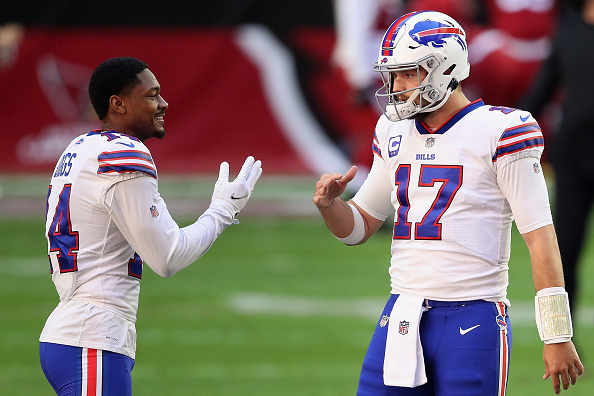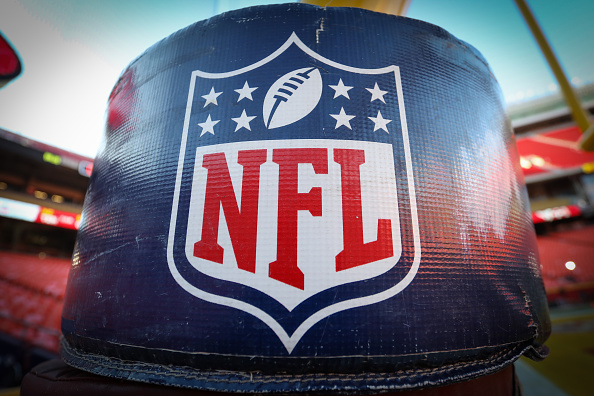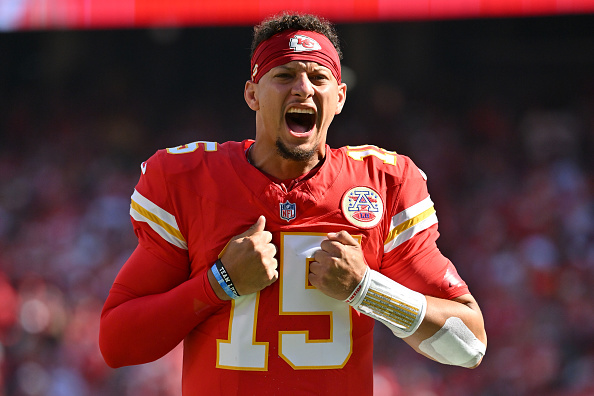After the Buffalo Bills went 10-6 in 2019, the team got aggressive in the offseason. Trading away several draft picks, the Bills acquired former Minnesota Vikings wide receiver Stefon Diggs. In his first season in Buffalo, Diggs and Josh Allen turned into fantasy superstars. Their performance helped the Bills finish with a 13-3 record last season and the No. 2 seed in the AFC playoffs. As Allen and Diggs enter their second year together, what can fantasy players expect from the Bills this season? Let’s dive into it.
Make sure to check out all of our other 2021 Fantasy Football Previews.
Quarterbacks – Josh Allen
In four-point per passing touchdown scoring, Allen finished as the QB1, averaging 24.8 fantasy points per game. Allen had two or more passing touchdowns in 81 percent of his games, throwing 37 on the season. Moreover, Allen had four games with four passing touchdowns compared to three with two or fewer. Despite the increase in his passing game, Allen continued to be a force on the ground, rushing for eight touchdowns for the third straight year.
During the offseason, the Bills signed Emmanuel Sanders to replace John Brown. More importantly, they didn’t sign or draft a running back. Last season, Allen’s eight rushing touchdowns counted for 50 percent of the team’s total. Unless Zack Moss or Devin Singletary improve at the goal line, Allen will remain the Bills’ goal line rusher. Short of an injury to Diggs, Allen is a lock for another top-three finish in 2021.
Running Backs – Devin Singletary, Zack Moss
Many expected the Bills to address the running back position in the offseason. Several draft experts projected the Bills would use their first-round pick on a running back. Instead, they didn’t spend a single draft pick on the position. Furthermore, the only addition the team made to the unit was signing Matt Breida. However, this backfield is one fantasy players should approach with caution as neither Singletary nor Moss finished as a top-30 running back last season.
Singletary averaged nine fantasy points per game last season after scoring 12.3 as a rookie. His yards per rushing attempt decreased by almost a full yard. However, he had a career-high 38 catches on 50 targets for 269 yards. More importantly, Singletary received only five more rushing attempts last year compared to his rookie season despite playing in four more games. The addition of Moss played a role in Singletary’s regression.
Speaking of Moss, the 2020 third-round pick had high expectations entering the season. However, he dealt with injuries and was ineffective when on the field. Moss averaged 4.3 yards per rushing attempt as a rookie. However, he averaged under 3.4 yards per attempt in more than 50 percent of his games. Moreover, Moss was touchdown-dependent last season. In the games he found the end zone, Moss averaged 15.2 fantasy points per game. By comparison, Moss averaged only 5.6 fantasy points per game when he failed to score a touchdown. With Allen playing such a critical role in the running game, combined with the Bills’ pass-happy offense, Singletary and Moss are dart throw running backs with limited upside. Fantasy players should avoid this backfield if possible.
Wide Receivers – Stefon Diggs, Gabriel Davis, Emmanuel Sanders, Cole Beasley
In his first season in Buffalo, Diggs had a career year, totaling 127 catches on 166 targets for 1,535 receiving yards. He also scored eight touchdowns and averaged 20.5 fantasy points per game. Furthermore, Diggs led the league in catches, targets, and receiving yards. Meanwhile, the Bills did very little to threaten his target share or role on the team in the offseason. The loss of Brown was offset with the addition of Sanders, though Davis expects to have the first crack at claiming Brown’s starting role. After averaging 10.4 targets per game to go along with a 29.2 percent target share last season, Diggs has a real shot to finish the season as the overall WR1 and easily average more than 20 fantasy points again.
As a rookie, Davis showed flashes of turning into a starting-caliber wide receiver. However, he finished fourth on the team among wide receivers, averaging 8.6 fantasy points per game. With Brown in Las Vegas, Davis should have the starting job opposite of Diggs. Furthermore, despite finishing fourth among wide receivers on the team in targets per game with 3.9, Davis finished second with seven touchdowns and first with a 10.8 percent touchdown rate. With Sanders and Beasley on the wrong side of 30, expect the Bills to limit their snaps and keep them healthy for the playoffs, opening up enough snaps and targets for Davis to turn into a weekly flex option or better.
After signing with the Bills in 2019, Beasley has turned into a favorite target of Allen’s. Beasley finished as the WR34 in 2019 and as the WR27 last year. However, Beasley projects to regress this season after the Bills added Sanders. As a member of the New Orleans Saints last season, Emmanuel Sanders finished as the WR41, averaging 11.8 fantasy points per game. In the 14 games he played, Sanders scored 10.5 or more fantasy points 10 times, including 21 or more twice. If Diggs misses time, Sanders turns into a borderline WR2. Overall, outside of Diggs, all three of the other receivers are later-round targets. Of the three, Davis offering the most upside and should get drafted in all standard size leagues.
Tight Ends – Dawson Knox, Jacob Hollister
Despite their tight ends averaging 1.3 catches, 13.8 receiving yards, and four fantasy points per game last season, the Bills didn’t spend a draft pick on the position. Instead, they signed Hollister to replace Tyler Kroft. During camp and the preseason, Hollister and Knox have battled for the starting role. Regardless of who wins the starting role, they have no fantasy value in standard size leagues. However, if the Bills add a tight end, particularly Zach Ertz, this position could produce fantasy value for fantasy players.
Defense/Special Teams
Last season, the Bills D/ST finished as the eighth-best unit, averaging 7.4 fantasy points per game. They finished middle of the pack with 38 sacks but finished tied for third with 26 total turnovers. The Bills’ ability to force turnovers led to them scoring 12 or more fantasy points in 25 percent of their games last season. Furthermore, the Bills made moves in the offseason to help their defense. They used their first two draft picks on defensive linemen Gregory Rousseau and Carlos Basham. The rookie duo should provide explosive play behind starters, Jerry Hughes and Mario Addison. After their moves this offseason, the Bills D/ST should have another top-10 finish this year.
Check us out on our socials:
Twitter: @PTSTNews and @TalkPrimeTime
Facebook Page: Prime Time Sports Talk
Join our Facebook Group: Prime Time Sports Talk
Instagram: @ptsportstalk
Follow Mike Fanelli on Twitter @Mike_NFL2
Main Image Credit:
Embed from Getty Images






